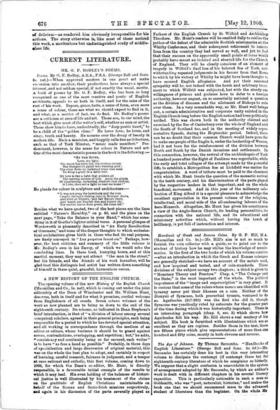CURRENT LITERATURE.
MR. G. F. BODLEI'S POEMS.
Poems. By G. F. Bodley, A.R.A., F.S.A. (George Bell and Sons. 5s. net.)—When approved masters in one great art make excursion into another, their productions have always a special interest, and not seldom special, if not exactly the usual, merits. A book of poems by Mr. G. F. Bodley, who has been so long recognised as one of the most creative and poetic of English architects, appeals to us both in itself, and for the sake of the rest of his work. Repose, grace, taste, a sense of form, even more a sense of colour, these are what we should expect to find in it, and what, as a matter of fact, we do find. Mr. Bodley's poems are a criticism at once of life and art. Those are, to our mind, the best which give most of the writer's self, whether as man or artist. These show him to have, undoubtedly, the "deep poetic heart," to be a child of the " golden clime." He loves love; be loves, and sings, truth and beauty. He mourns over the decay of beauty in modern life. He is a musician, and happily calls fine architecture, such as that of York Minster, "music made manifest." Pre- dominant, however, is the sense for colour in Nature and art- One of the most characteristic poems in the book is the following THE RIVER,
Love, my light,
The moon has risen red, the restless stream Has changed Its pallor Into running gold The river flows by darkened trees that seem To wrap a glory In a sable fold.
My love Is like a light that goldens all The moving stream of Life. Amid the gloom Of lengthening, darkening, shadows that enthral, 0 Love, thou art a light to lead me home I"
Be pleads for colour in sculpture and architecture :—
It was not gray the hawthorn and the rose Caught the sun's sinking rays on Bourget'' doors, And even at Tintern, 'mid fair Nature there, And 'neath our English dim and humid sky, The carved leaves were green, the roses red."
Besides what we have quoted, two of the best pieces are the lines entitled " Nature's Heraldry," on p. 60, and the piece on the next.page, "Take the Balance in your Hand," which has some- thing in it of Goethe's lighter critical verse. A personal glimpse of Wordsworth is pleasantly described in "An Early Recollection of Grasmere," and some of the deeper thoughts to which ecclesias- tical architecture gives birth in those who feel its real purpose, are finely conveyed in " Lux perpetua Zuceat eis." Perhaps, how- ever, the best criticism and summary of the little volume is Mr. Bodley's own in his Envoy, of which we would echo the concluding lines. In these loud, hurrying hours, and at this martial moment, they may not attract "the man in the streets" but his friends, and the friends of his work hereafter, will be glad that this distinguis bed artist has written down something of himself in these quiet, graceful, harmonious verses.






































 Previous page
Previous page